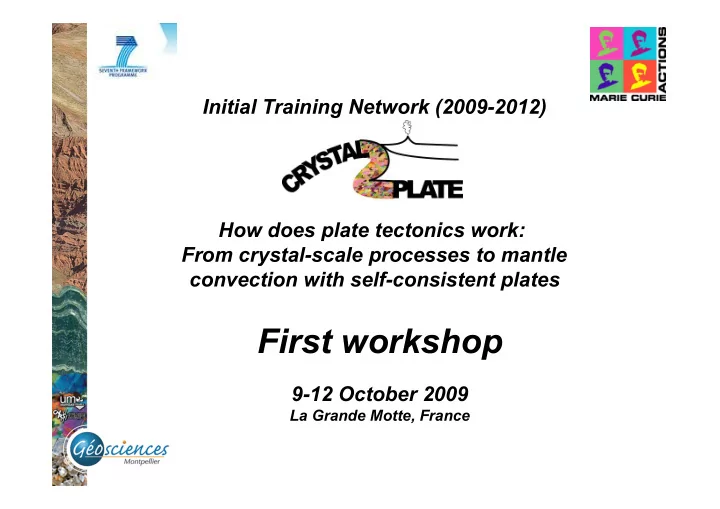

Initial Training Network (2009-2012) How does plate tectonics work: From crystal-scale processes to mantle convection with self-consistent plates First workshop 9-12 October 2009 La Grande Motte, France
Initial Training Network (2009-2013) How does plate tectonics work: From crystal-scale processes to mantle convection with self-consistent plates 7 institutions: Geosciences Montpellier, FAST-Orsay, Bristol, ETH, Roma 3, Utrecht, CISC-Granada ~25 permanent researchers 4 associated partners: Rockfield, Schlumberger, Total, Oxford Instruments 2 ERs (postdocs) & 10 ESRs (PhD) 4 workshops (annual) 4 short courses (Texture & Anisotropy, Seismic Signal, PERPLEX, Convection in complex fluids) 2.7 M euros
Training program • Core of the training program = collaborative research projects (ESR= PhD) • 3 scientific work packages • WP1: How to create new plate boundaries (A. Davaille & J.L. Bodinier) • WP 2: Plates and convective patterns in subduction (M.Kendall & T. Gerya) • WP3: Plates in mantle convection: the global story (P. Tackley & N. Ribe)
Recruitment results Project ESR’s Name Na3onality Number ESR1 Ms. Flora BAJOLET French ESR2 Mr. Tobias ROLF German ESR3 Ms. Kate HIGGIE BriBsh ESR4 Mr. Erwin FRETS French ESR5 Mr. Marcel THIELMANN German ESR6 Ms. Diana DYMKOVA Russian ESR7 Ms. JeaneMe DI LEO German ESR8 Ms. Anna MASSMEYER German ESR9 Mr. Roberto AGRUSTA Italian ESR10 Ms. Katherine ADENA Australian ER1 Ms. Sonja GREVE German ER2
Tutoring & Evaluation (1) • Advisory Committee: 2 supervisors + 2 members (external to the PhD project) follow-up of the ESR/ER projects & personal career development plan assist for the assessment meeting at the end of the contract for final evaluation, plans/perspectives discussion, and help with integration into the professional world • Personal Career Development Plan IMPORTANT: basis for assessment of ESR/ER progress • Long-term career objectives (goals & what is planned to reach them) • Short-term career objectives (research project, skills & techniques to be acquired, management = work plan, scientific & PCD courses planned, other professional training, networking activities planned) to be completed with the assistance of AC in the first 3 months assessed and adjusted yearly with the assistance of the AC report on the success of the objectives: included in the ITN report
Tutoring & Evaluation (2) EVALUATION at the end of the 1 st year (2 nd CRYSTAL2PLATE workshop): fellows will report and defend their work progress to the CRYSTAL2PLATE Supervisory Board SB decides whether the candidate is eligible to continue in the programme or not, taking into account the recommendations of the AC Other Tutoring Issues Practical assistance concerning working and living in another country : • coordination team: Nathalie Modjeska • locally : supervisor, young permanent researcher of the group, or host inst. administrative officer G ender issues : implementing, if desired by the female ESRs/ERs, an individual tutoring by one of the female PIs
CRYSTAL2PLATE Management Structure Project officer: G. Donini A. Tommasi, N. Modjeska 7 Pis+ M.Dutko + ESR + Y. Ricard (Lyon) & C. Thomas (Munster) M. Kendall H. Paulssen A. Tommasi A. Davaille N. Modjeska F. Funiciello J. Wookey A. Tommasi
Recruiting and employing the ESRs/Ers Employment contract & salary Salary : EC funding corresponds to the gross salary (net salary + employer social security charges): - Living and Mobility allowance (Budget Category A) = fixed amount depending on family status @ the date of recruitment, adjusted for country of host institution - Travel allowance (Budget Category B) = fixed amount, depends on distance between country of origin and host institution ( € 250-2500, paid once a year) - Career Exploratory allowance (Budget Category C) = € 2000 paid once for each researcher with a stay of at least 1 year in the host institution All these allowances are for personal use, not for research, training, or tuition fees! Expenses related to training & research: funding administrated by supervisors Career Development Plan
Marie Curie Fellow’s obligations • Devoted full-time and exclusively to the project • Dissemination: remember to inform us on all your dissemination and send us pdfs of articles/posters/abstracts together with links and references. • Acknowledge Crystal2Plate properly in all situations: “ The research leading to these results has received funding from Crystal2Plate, an FP7-funded Marie Curie Action under grant agreement number PITN-GA-2008-215353 ”. • Commit to complete evaluations and questionnaires = EC evaluation of the ITN • Maintain contact details so as to be reachable up to 3 years after the end of project
Useful links In addition to reviewing the official documents describing the project (Grant Agreement, Annex 1, Annex 2, Annex 3) we invite you to find out more about your status as a Marie Curie fellowship recipients by visiting the sites below: • Marie Curie Actions home page http://ec.europa.eu/research/mariecurieactions For general information and career opportunities in research • Euraxess at http://ec.europa.eu/euraxess/index_en.cfm? for resources on your rights, national specificities, research opportunities and more • Marie Curie Fellows association at http://mcfa.eu for good tips from fellow Marie Curie recipients
Recommend
More recommend